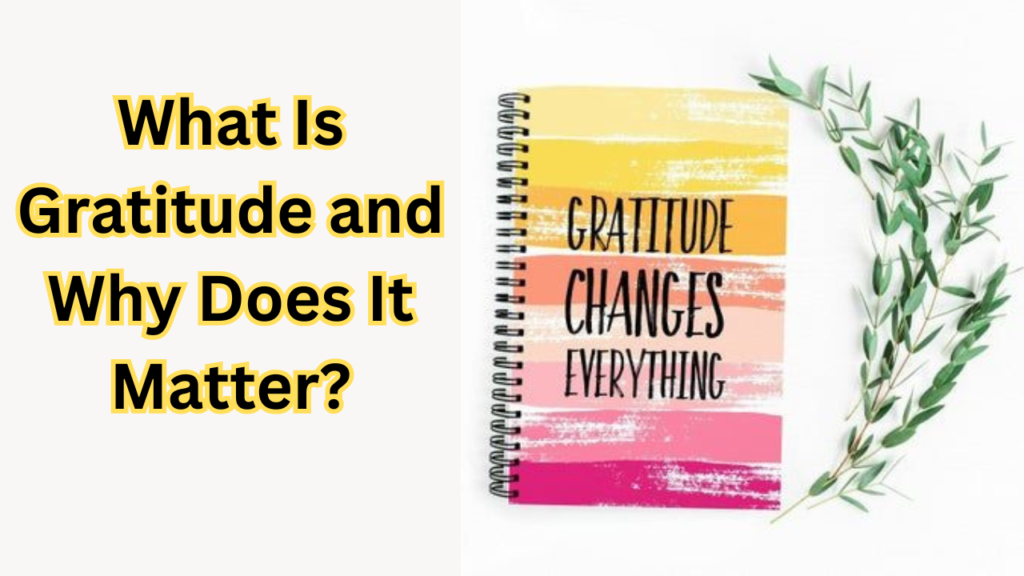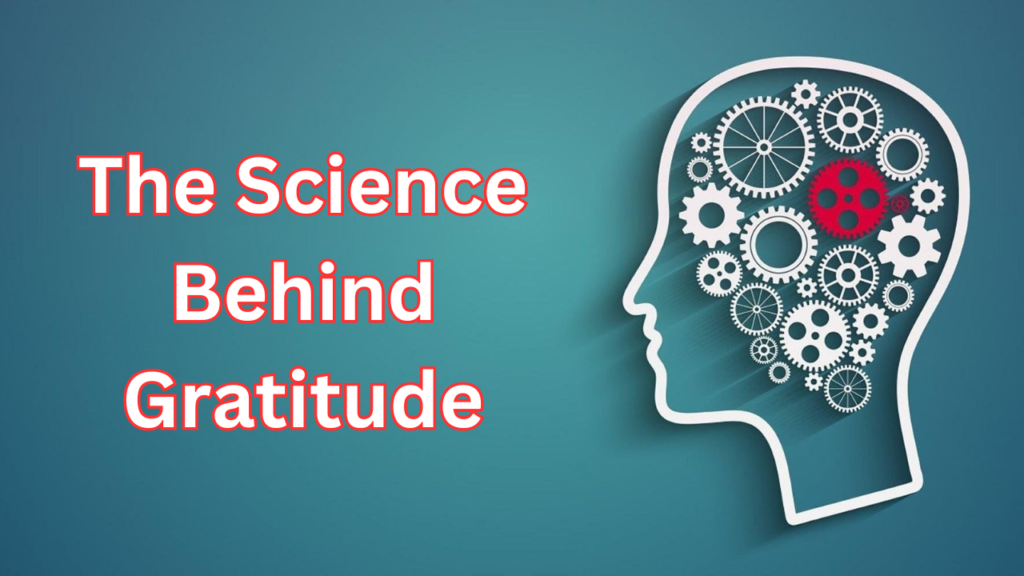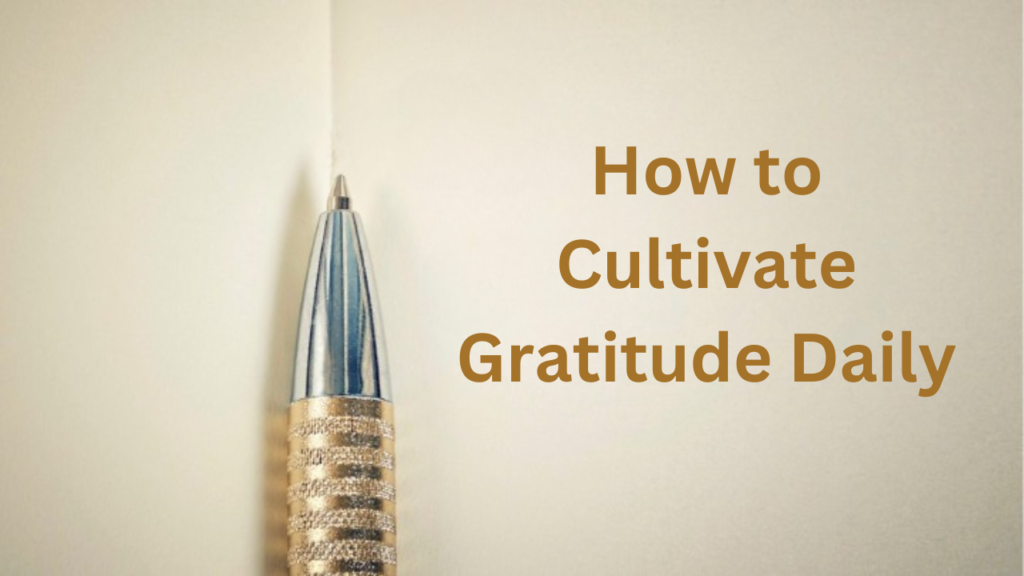Set in the whirlwind of day-to-day life the small blessings we’re surrounded with every day may be easily forgotten. But one of the easiest yet most effective strategies to improve your overall well-being is by developing gratitude. There is abundant research that shows that practicing gratitude leads to happier, less stressed, and even physically healthier lives. But how do you make gratitude a habit, when the world so often trains us on what we don’t have?
In this article, we’ll explore the transformative power of gratitude and provide actionable steps to integrate it into your daily routine for a more joyful and fulfilling life.

What Is Gratitude and Why Does It Matter?
Saying thank you is not the only expression of gratitude. It involves having a profound appreciation for the people events and possessions that make your life worthwhile. Recognizing these blessings causes your brain to release the feel-good chemicals serotonin and dopamine which lower stress and increase happiness.
Research suggests that gratitude can:
- Strengthen relationships
- Improve mental and emotional health
- Enhance sleep quality
- Boost self-esteem
- Encourage resilience during difficult times
Being grateful helps you concentrate on what’s right rather than what’s wrong which makes it easier to find joy even in trying times.

The Science Behind Gratitude:
Gaining knowledge of the science behind gratitude can help make its advantages more apparent. According to a study in Frontiers in Psychology people who practiced gratitude saw improvements in their mood and mental health that lasted for a long time. A positive outlook on life is reinforced by gratitude which activates brain regions linked to reward morality and interconnectedness.
Furthermore, gratitude has a ripple effect. When you express thankfulness, it encourages others to do the same, fostering a culture of positivity in your social circles.
Although it is frequently dismissed as a mere expression of gratitude gratitude has strong scientific foundations that impact mental emotional and physical health. Fundamentally gratitude is an appreciation of lifes good things which strengthens bonds between people and their surroundings. Gratitude activates brain areas linked to reward and social bonding including the ventral striatum and medial prefrontal cortex according to psychology and neuroscience research. Feel-good neurotransmitters like serotonin and dopamine are released in these areas improving mood and fostering long-term happiness. Moreover cultivating gratitude can lessen anxiety and promote emotional resilience by lowering cortisol levels the body’s main stress hormone.
Gratitude affects physical health as well. Research indicates that people who express gratitude regularly have better heart health lower blood pressure and better sleep. This may be the case because being grateful promotes healthful habits like exercising eating better and following medical advice. Gratitude fosters empathy and mutual appreciation which are essential for preserving connection and trust in social interactions. Writing about what one is grateful for in a gratitude journal has become more and more popular because it has been shown to gradually rewire the brain to be more positive.
Essentially being grateful is a transformative practice supported by science rather than a transient emotion. People can cultivate stronger relationships improve their general quality of life and cultivate an optimistic outlook that finds the positive in even the most difficult situations by adopting an attitude of thankfulness.
Barriers to Gratitude:
Even though it has many advantages many people find it difficult to regularly practice thankfulness. The following are typical obstacles:
- Negativity bias: Our brains are wired to focus on threats and problems rather than positive experiences.
- Busy lifestyles: In a modern 21st-century world, it’s easy to overlook moments of joy.
- Comparison culture: Feelings of inadequacy are frequently exacerbated by social media making it more difficult to appreciate what you have.
Overcoming these barriers requires intentionality and practice.

How to Cultivate Gratitude Daily:
A powerful technique that can change your perspective and improve your general well-being is practicing gratitude every day. First start a gratitude diary in which you list three things for which you are grateful every day. This easy exercise aids in changing attention from problems to life’s good things. Adding mindfulness is another powerful strategy to cultivate gratitude pausing to appreciate small commonplace things such as a warm cup of coffee or a supportive remark from a coworker can increase your sense of gratitude. Thanking people whether via a sincere message text or just a thank you improves relationships and spreads happiness. Furthermore before going to bed repeating affirmations or thinking back on pleasant experiences can support an attitude of gratitude. Integrating these practices into your daily routine fosters a persistent attitude of thankfulness that improves happiness lowers stress levels and fortifies emotional fortitude.
Creating a gratitude habit doesn’t have to be time-consuming or complicated. Here are practical steps to incorporate gratitude into your daily life:
- Start a Gratitude Journal:
Putting your blessings in writing is one of the best ways to develop a habit of gratitude. Spend a few minutes every day writing down three to five things that you value. A warm cup of coffee a supportive remark from a friend or the splendor of a sunset could all be considered examples of these.
- Practice Mindful Gratitude:
As you go about your everyday business take a moment to enjoy the here and now. Whether you’re eating walking or spending time with loved ones mindfulness helps you appreciate the small pleasures that are sometimes overlooked.
- Express Gratitude to Others:
Recognize and express gratitude to those who improve your life. Send a brief message write a heartfelt note or thank them in person. This improves your happiness and fortifies your bonds with others.
- Create Visual Reminders:
Put sticky notes with questions about gratitude in places that people can see like your desk refrigerator or mirror. You may be encouraged to concentrate on the good things that happened during the day by these reminders.
- Use Technology Mindfully:
Make use of applications to assist you in monitoring your practice of gratitude. As an alternative avoid online negativity and follow accounts or pages that promote optimism.
6. Reflect Before Sleep:
Consider the highlights of your day no matter how minor as you wrap it up. This habit can help you sleep better and start the day off on a good note.
The Role of Gratitude in Relationships:
Having gratitude is essential for establishing and preserving relationships. Your loved ones will feel appreciated and loved when you express gratitude to them. A simple thank you or gesture of kindness can have a significant impact on enhancing trust and communication. By concentrating on a relationship’s positive aspects gratitude helps avoid needless arguments and misunderstandings. Additionally, it promotes a reciprocal cycle of giving and receiving wherein both parties are inspired to be kind and considerate. Regular expression of gratitude strengthens bonds between people by fostering deeper healthier and more meaningful connections.
The foundation of wholesome and satisfying relationships is gratitude. Trust and respect are fostered when you continuously express gratitude to your partner friends or coworkers. Recognizing someone’s efforts or simply saying thank you can have a significant impact on your relationship.
Together with a loved one think about beginning a gratitude journal or having regular conversations about your blessings. This exercise strengthens your connection and assists you both in concentrating on your relationship’s advantages.
The Transformative Power of Gratitude during Challenges:
During difficult times gratitude can be particularly effective. Finding reasons to be grateful in the face of hardship may seem counterintuitive but it can keep you resilient and in perspective.
For example:
- If you’re facing a setback at work, focus on the skills and experiences you’ve gained.
- During health challenges, appreciate the support system around you.
- In moments of uncertainty, be thankful for your ability to adapt and learn.
One way to foster optimism and hope is to reframe obstacles as chances for development.
How to Stay Consistent:
It takes consistency to develop an attitude of gratitude. These pointers will help you stay on course:
- Set reminders: Use alarms or calendar notifications to remind yourself to practice gratitude.
- Make it social: Share your gratitude practice with a friend or family member to stay accountable.
- Celebrate progress: Recognize the changes in your mindset and mood as you practice gratitude.
Remember, gratitude is a journey, not a destination. Be patient with yourself as you develop this habit.

Gratitude as a Lifestyle:
A positive outlook and long-lasting happiness can result from incorporating thankfulness into your daily routine. Finding things to be grateful for even in everyday situations is what it means to live a life of gratitude. For instance, you may be grateful for the sunshine a satisfying meal, or quality time with family and friends. This way of thinking lowers stress and boosts contentment by assisting you in concentrating on your possessions rather than your shortcomings. Because expressing gratitude builds bonds and spreads positivity it also enhances relationships. Saying thank you frequently journaling or thinking back on the positive aspects of your day are all easy ways to make gratitude a regular part of your routine. Your brain is gradually rewired to notice more positive things as a result of this practice which makes life feel richer and more rewarding. Being grateful not only enhances your mental well-being but also makes people around you more compassionate and joyful.
Gratitude changes your perspective on life when it becomes a daily habit. You will become more resilient happier and more socially connected. With time being grateful becomes a natural aspect of who you are rather than a conscious practice.
Imagine waking up daily with a sense of abundance, appreciating life’s simple pleasures, and feeling deeply connected to the world around you. That’s the power of gratitude.
Conclusion:
More than just a passing feeling gratitude is a way of life that promotes happiness fortitude and community. You can unleash its transformative potential and lead a happier more fulfilling life by implementing tiny regular practices into your everyday routine.
So why delay? Begin your path to gratitude now. Every action you take whether it is writing in a journal saying thank you with sincerity or just pausing to think moves you one step closer to living a heartfelt and joyful life.
FAQS:
What is gratitude, and why is it important?
Gratitude involves a deep appreciation for people, events, and possessions that make life meaningful. It promotes mental, emotional, and physical well-being by fostering happiness, lowering stress, improving relationships, and enhancing resilience.
How does gratitude affect mental and physical health?
Gratitude activates brain areas associated with reward and social bonding, releasing serotonin and dopamine, which elevate mood and reduce stress. It also improves heart health, lowers blood pressure, and encourages healthy habits like exercise and mindfulness.
What are the common barriers to practicing gratitude?
Barriers include negativity bias, which focuses on problems over positives; busy lifestyles, which overshadow moments of joy; and comparison culture, often fueled by social media, which amplifies feelings of inadequacy.
How can I integrate gratitude into my daily life?
Practical strategies include maintaining a gratitude journal, practicing mindful appreciation of small moments, expressing gratitude to others, using visual or technological reminders, and reflecting on positive experiences before sleep.
How does gratitude improve relationships?
Gratitude strengthens relationships by fostering trust, communication, and mutual appreciation. Expressing gratitude through words or gestures deepens connections, reduces conflicts, and promotes a positive cycle of giving and receiving.
